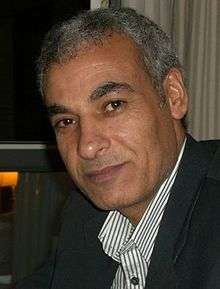Muhsin al-Ramli
Muhsin Al-Ramli (Arabic: محسن الرملي, officially known as Muhisin Mutlak Rodhan;[1] born 7 March 1967) is an expatriate Iraqi writer living in Madrid, Spain since 1995. He is a translator of several Spanish classics to Arabic. He produced the complete translation of Don Quixote from Spanish to Arabic. He teaches at the Saint Louis University Madrid Campus.[1] He is the current editor of Alwah, a magazine of Arabic literature and thought, which he co-founded.
Muhsin Al-Ramli | |
|---|---|
 | |
| Born | Muhsin Al-Ramli March 7, 1967 Sedira, Iraq |
| Occupation | writer poet translator academic |
| Language | Arabic Spanish English |
| Nationality | Iraqi |
| Alma mater | Autonomous University of Madrid |
| Notable works | 'Scattered Crumbs Fingers of Dates We Are All Widowers of the Answers |
| Website | |
| muhsinalramli | |
Early life and education
In 2003, he earned a Doctorate in Philosophy and Letters and Spanish Philology from the Autonomous University of Madrid. His thesis topic was The Imprint of Islamic Culture in Don Quixote. He is the brother of the writer and poet Hassan Mutlak.[2][3]
Published works
- Gift from the Century to Come (Short stories) 1995
- In Search of a Live Heart (Theater) 1997
- Papers far from the Tigris (Short stories) 1998
- Scattered Crumbs (Novel) 2000
- The Happy Nights of the Bombing (Narrative) 2003
- We Are All Widowers of the Answers (Poetry) 2005
- Dates on My Fingers (Novel) 2008
- Asleep among the Soldiers (Poetry) 2011
- The Oranges Of Baghdad and Chinese Love (Short stories) 2011
- The President's Gardens (Novel) 2012
- The wolf of love and books (Novel) 2015
Translations
1. Laranjas e giletes em Bagdá/Naranjas y cuchillas en Bagdad, Fedra Rodríguez Hinojosa (Trans.), (n.t.) Revista Literária em Tradução, nº 1 (set/2010), Fpolis/Brasil, ISSN 2177-5141
References
- "Faculty : Saint Louis University Madrid Campus : SLU". www.slu.edu. Archived from the original on 2018-04-26. Retrieved 2017-05-13.
- "Muhsin Al-Ramli (Iraq, 1967)". XX international Poetry Festival of Medellín. Archived from the original on 20 July 2011. Retrieved 11 August 2010.
- Francisco Reina, M. (6 April 2008). "Cultura Dedos de Dátiles". ABC (in Spanish). Madrid: ABC Periódico Electrónico S.L.U. Retrieved 11 August 2010.
External links
- The documentary about Al-Ramli in the Arabic channel: ALJAZEERA
- Documentary in the Spanish Channel TVE, about: The Iraqi writer Muhsin Al-Ramli.
- Al-Ramli: "I Am Iraq" / By Constanza Vieira / IPS
- Official blog
- Poem by Muhsin Al-Ramli / review (BLACK RENAISSANCE NOIRE), Vol7 Nº2, 2007 New York
- Review / Scattered Crumbs / Family Matters / by Harold Braswell
- from Scattered Crumbs by Muhsin Al-Ramli
- About: Asleep among the Soldiers by Muhsin Al-Ramli / in Aljazeera.net (in Arabic).
- Interview with the author
- IPAF
- Longlist Announced for 2013 International Prize for Arabic Fiction
- Looking at the 2013 Longlist: Muhsin al-Ramli’s ‘The President’s Gardens’
- About The President’s Gardens in Aljazeera.net